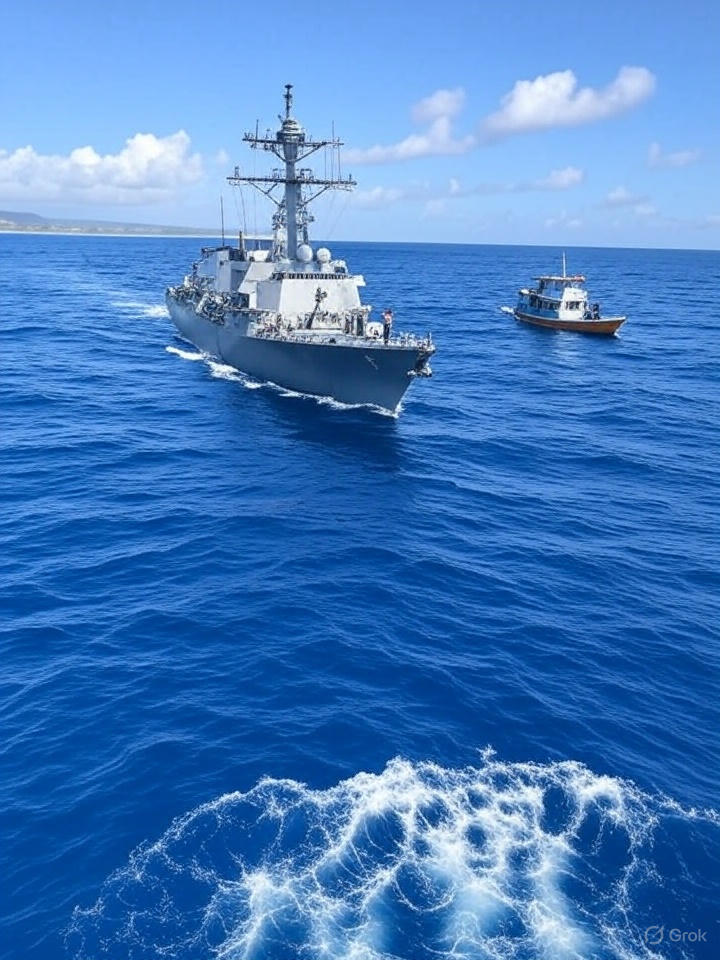The United States conducted a military strike on a speedboat in international waters off the Venezuelan coast, resulting in the deaths of 11 individuals aboard. The Trump administration identified the vessel as a drug-smuggling operation linked to the Venezuelan gang Tren de Aragua, which has been designated a terrorist organization. Officials stated that the boat was transporting illegal narcotics destined for the United States, and the action was carried out under the laws of armed conflict to disrupt cartel activities. The strike involved a U.S. destroyer, and personnel from a Navy ship subsequently inspected a Venezuelan fishing boat for drugs in the region, confirming the presence of illicit cargo in separate operations. Venezuelan authorities, including Interior Minister Diosdado Cabello, disputed the claims, asserting that the individuals killed were not members of Tren de Aragua or involved in drug trafficking. Investigations by Venezuelan officials identified the deceased as local fishermen from coastal towns, with families demanding the return of remains. Cabello emphasized that none of the victims had criminal records related to gangs or narcotics, and the government demanded accountability for what it described as an unprovoked attack. In response, Venezuela announced the deployment of additional military vessels to patrol the Caribbean Sea and Gulf of Venezuela, involving approximately 15,000 armed forces personnel to monitor territorial waters and counter perceived threats. The incident has prompted a broader U.S. military buildup in the Caribbean, including the deployment of three guided-missile destroyers, an additional 10 fighter jets to Puerto Rico, and F-35B stealth aircraft landings on the island. This escalation aims to enhance operations against drug cartels operating from Latin America, with President Trump considering further strikes on suspected targets inside Venezuela as part of a strategy to pressure the Maduro regime. The administration has doubled the reward for information leading to the arrest of Venezuelan President Nicolás Maduro to $50 million, citing his alleged role in narco-terrorism and collaboration with groups like the FARC dissidents for cocaine shipments. United Nations reports indicate that Venezuela serves as a transit point for cocaine originating primarily from Colombia, with shipments often using go-fast boats, fishing vessels, and container ships along the country’s extensive coastline. The U.S. Department of Justice maintains charges against Maduro and 14 associates for narco-terrorism, corruption, and money laundering, alleging protection for traffickers in exchange for political support. Venezuelan officials countered that 87% of South American drug flows occur via the Pacific route, and recent UN assessments do not list Venezuela as a primary production or distribution zone. They highlighted that 85% of global drug profits remain in the U.S. financial system and called for addressing domestic consumption. In the U.S., Senator Jack Reed, ranking Democrat on the Senate Armed Services Committee, questioned the strike’s justification, noting a lack of evidence that the boat was engaged in drug trafficking or posed an immediate threat. The administration has not released proof of the vessel’s cargo or crew affiliations, leading to congressional calls for transparency on expanded war powers. Pentagon spokesperson Sean Parnell affirmed that actions target narco-terrorists in international waters to protect American communities from fentanyl and other drugs. Analysts note that such operations could strain regional relations but aim to dismantle illicit networks sustaining Maduro’s government through revenues from narcotics, illegal mining, and smuggling. Venezuela’s response includes a public campaign enlisting citizens for national defense, emphasizing sovereignty and cooperation with international anti-drug efforts. Defense Minister Vladimir Padrino López confirmed patrols to combat armed groups along the Colombian border. The event has drawn statements from global figures, underscoring the need for verified intelligence in counter-narcotics actions. Ongoing U.S. interdictions in the Caribbean have seized significant quantities of cocaine, with experts estimating Venezuela’s role facilitates access to global markets via its porous borders and ports like La Guaira.
www.34news.online
www.34news.online

